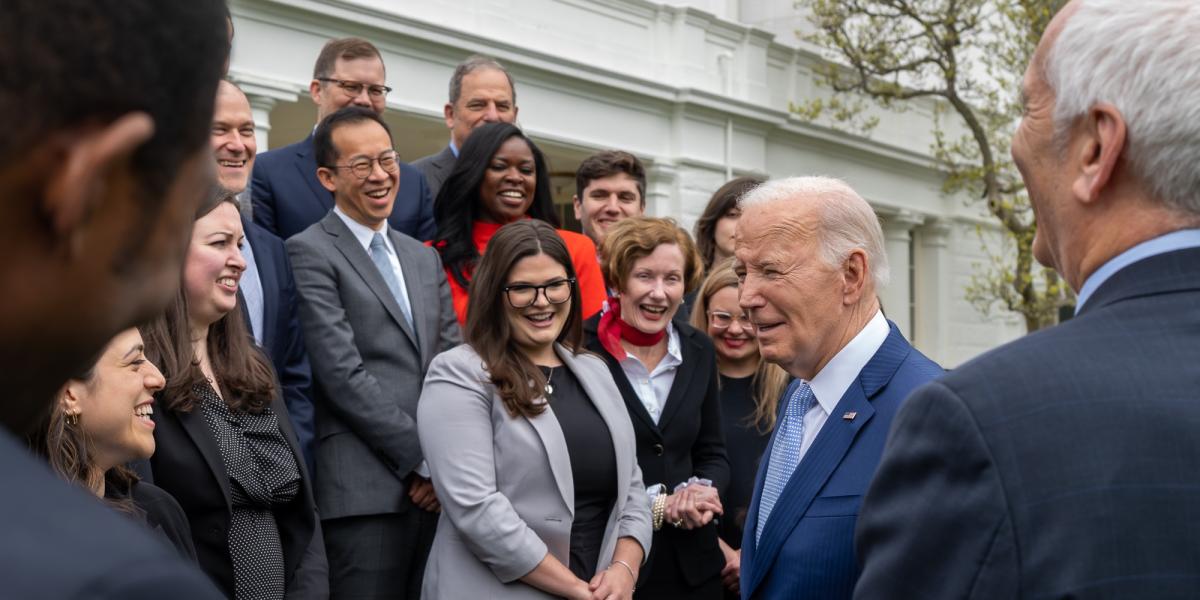
Who does the White House call when they need to analyze a policy idea? It turns out to be the White House Council of Economic Advisers (CEA). Between August 2023-October 2024, Associate Professor Kyle Meng served as CEA’s senior economist for climate, energy, and environment. Now back at emLab as the Director of our Climate & Energy Program, Kyle sat down with our team to share valuable insights and lessons learned from his time shaping policy at the highest levels of government.
What was your role at the White House?
The CEA is the President’s in-house think tank tasked with providing objective economic analysis on various policy matters confronting the Administration. As the Administration’s Senior Climate Economist, anything related to climate, energy, and environment that needed policy analysis hit my desk. I led a small but mighty team of staff economists to provide that analysis in a rigorous and timely manner.
What kind of work were you asked to do?
The work really varied day to day.
A key job for White House staff is to help the President process and evaluate minute-by-minute developments occurring around the world. Whether it’s a historic El Nino and its environmental consequences around the world, recent events energy markets, or disruptions to global trade routes, something is always happening on the planet that affects the Administration’s climate efforts. And the President needs rapid assessments of these developments to formulate policy responses. That made every day a bit different in terms of what I had to learn and analyze.
There was also a lot of (relatively) longer term work involving implementation of the President’s Executive Orders and major legislations, like the Inflation Reduction Act, and the development of new climate and environmental policies. Any White House policy announcement the public sees is the end result of an involved process where experts across multiple government agencies weigh in and analyze different policy options. CEA’s institutional role in these deliberations is to provide the President with independent, objective analysis of the economic (and in my case climate) consequences of these options.
How does this role differ from your role in academia?
In academic research, we have the luxury of taking the time to get things right. In the White House, an answer is always several hours late, all while the question itself is constantly evolving under fast moving developments. And it is CEA’s task (and challenge) to meet this urgency with the same rigor and objectivity that I aim for in my academic research. There were many, many very late nights.
What work are you most proud of during your time at the CEA?
I feel fortunate to have had the opportunity to bring almost two decades worth of climate policy experience and research to the White House. But more than anything, I was most proud to serve my country with amazingly talented and committed colleagues across the federal government, people who approached their climate policy work with a seriousness of purpose and a dedication to public service that matched the moment we’re in.
What do you think is the future of climate policy in the US?
The clean energy transition is well underway and there is no turning back. U.S. greenhouse gas emissions continue to fall. Globally, emissions are still rising, but that growth is slowing considerably. For the first time, one can really see all the pieces for a net zero global economy in place: electricity from renewables and batteries, electrified cars and homes, and emerging new zero-carbon fuels for heavy industry and air travel. This is no longer some pipe dream. The economic forces behind all these pieces are all in play today. In fact, we put together an economic framework for such a decarbonized future in Chapter 6 of the Economic Report of the President.
The key is to keep all those economic drivers for clean energy going. A great place to start is to double down on meaningful state climate policies, like California’s cap-and-trade program, which my research has shown has led to significant emission cuts and is driving the 5th largest economy in the world towards its ambitious climate goals. Keeping federal incentives in place, such as tax credits under the Inflation Reduction Act, will also be important.
To learn more about Kyle's work, watch his recent lecture on "The Future of U.S. Climate and Trade Policy" at the Harvard Kennedy School, or explore his research and his bio on our website.




